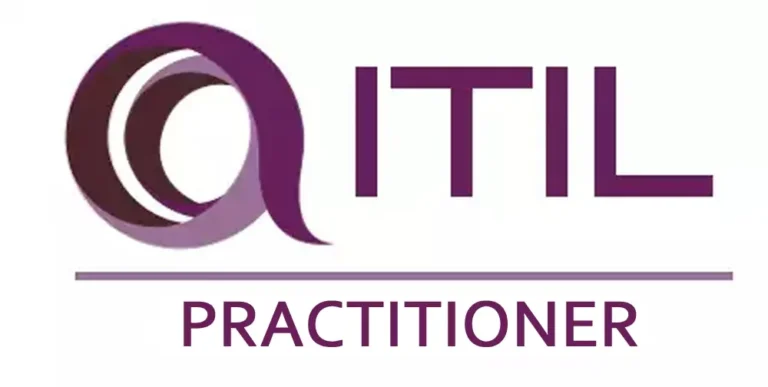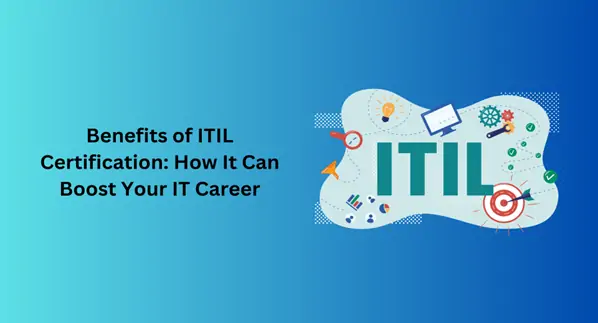Enhance your IT service management skills with ITIL Practitioner certification. Learn practical methods to drive continual service improvement and deliver value to your organization.

Introduction
In today’s fast-paced and ever-evolving IT landscape, organizations are constantly seeking ways to enhance their service management practices and optimize IT processes. This quest for excellence has led to the widespread adoption of ITIL (Information Technology Infrastructure Library), a globally recognized framework for IT service management. Within the ITIL certification framework, the ITIL Practitioner Certification stands out as a pivotal step towards mastering the art of IT service management. In this comprehensive guide, we will delve into the world of ITIL Practitioner Certification Training, exploring its importance, benefits, and the key elements that make it a must-have for IT professionals and organizations alike.
The Significance of ITIL Practitioner Certification
ITIL Practitioner Certification serves as a bridge between the foundational ITIL certifications (ITIL Foundation) and the more advanced ones (ITIL Intermediate and Expert levels). It is designed to equip IT professionals with the practical skills and knowledge required to effectively apply ITIL principles in real-world scenarios. Let’s explore why this certification holds such great significance.
1. Real-World Application
One of the key differentiators of the ITIL Practitioner Certification is its focus on real-world application. Unlike some other ITIL certifications that primarily cover theory and concepts, ITIL Practitioner delves deeper into practical implementation. This makes it highly relevant for IT professionals seeking to drive tangible improvements in their organizations.
2. Problem-Solving Approach
ITIL Practitioner places a strong emphasis on problem-solving and continuous improvement. It equips professionals with a set of guiding principles and tools that enable them to identify, analyze, and resolve service management challenges efficiently. This problem-solving approach is invaluable in today’s complex IT environments.
3. Adaptability
In the ever-changing world of IT, adaptability is key. ITIL Practitioner teaches professionals how to tailor and adapt ITIL practices to suit their organization’s unique needs and objectives. This adaptability is essential for organizations seeking to stay agile and responsive to changing business requirements.
4. Team Collaboration
Successful IT service management is a collaborative effort. ITIL Practitioner promotes effective collaboration among IT teams and other departments within an organization. This collaborative approach ensures that IT services align with overall business goals.
Key Elements of ITIL Practitioner Certification Training
Now that we’ve established the importance of ITIL Practitioner Certification, let’s dive into the key elements that make up this comprehensive training program.
1. Guiding Principles
ITIL Practitioner introduces candidates to nine guiding principles that provide a solid foundation for decision-making and service management. These principles include focusing on value, designing for experience, and keeping it simple and practical. Understanding and applying these principles is fundamental to ITIL Practitioner Certification.
2. CSI Approach
Continual Service Improvement (CSI) is a core concept in ITIL, and ITIL Practitioner places a strong emphasis on this approach. Candidates learn how to identify areas for improvement, set objectives, measure progress, and implement necessary changes. The CSI approach ensures that IT services evolve to meet changing business needs.
3. Metrics and Measurement
Effective service management requires data-driven decision-making. ITIL Practitioner covers the importance of defining and using key performance indicators (KPIs) to monitor and measure service performance. This data-driven approach empowers organizations to make informed decisions and drive improvements.
4. Organizational Change Management
Implementing ITIL practices often involves organizational change. ITIL Practitioner provides guidance on managing these changes effectively. Candidates learn how to assess the impact of changes, communicate with stakeholders, and ensure a smooth transition.
5. Communication and Collaboration
Effective communication and collaboration are essential in service management. ITIL Practitioner emphasizes the importance of clear and efficient communication, both within IT teams and with other business units. Collaboration skills are honed to foster a culture of cooperation and alignment.
6. Practical Tools and Techniques
Throughout the ITIL Practitioner training, candidates are exposed to a range of practical tools and techniques that can be applied in real-world scenarios. These tools include the ITIL CSI approach, the ITIL SWOT analysis, and various communication templates, among others.
Benefits of ITIL Practitioner Certification
Now that we’ve explored the key elements of ITIL Practitioner Certification Training, let’s discuss the numerous benefits it offers to both individuals and organizations.

1. Enhanced Career Opportunities
Earning an ITIL Practitioner Certification opens doors to a wide range of career opportunities. Many organizations require or prefer candidates with ITIL certifications when hiring for IT service management roles. Whether you’re looking to advance in your current job or explore new career paths, ITIL Practitioner can significantly boost your prospects.
2. Improved Service Management Skills
ITIL Practitioner equips you with practical skills that can be applied immediately in your workplace. This leads to improved service management practices, increased efficiency, and better service delivery. As a certified practitioner, you’ll be better equipped to contribute to your organization’s success.
3. Increased Confidence
Certification provides a sense of achievement and confidence. Knowing that you have the knowledge and skills to tackle real-world service management challenges boosts your self-assurance and empowers you to take on more significant responsibilities.
4. Organizational Benefits
For organizations, having ITIL Practitioners on their team translates to better service quality, increased customer satisfaction, and reduced operational costs. ITIL Practitioners are equipped to identify and address service issues proactively, resulting in fewer disruptions and improved business continuity.
5. Alignment with Best Practices
ITIL Practitioner Certification demonstrates your commitment to adopting and implementing ITIL best practices. This alignment ensures that your organization is on the right path to delivering high-quality IT services that align with business objectives.
Unleash Your Potential with ITIL Practitioner Certification:
1. The Significance of ITIL Practitioner Certification:
ITIL (Information Technology Infrastructure Library) Practitioner Certification is a highly respected credential in the field of IT service management. It signifies your proficiency in ITIL practices and principles, demonstrating your capability to effectively manage IT services, align them with business goals, and continuously improve service delivery.
- BlueMorpho Learning: Your Partner in Excellence: BlueMorpho Learning is your chosen educational partner on this journey. We are here to provide you with the knowledge, resources, and support you need to achieve your ITIL Practitioner Certification and thrive in the IT service management domain.
2. A Gateway to Unlocking Your Full Potential:
- Beyond Just a Credential: Your pursuit of ITIL Practitioner Certification is not merely about obtaining a certificate to add to your resume. It’s a pathway towards personal and professional growth. This credential is a testament to your commitment to achieving excellence in IT service management and to advancing your career.
- Commitment to Excellence in IT Service Management: ITIL is a globally recognized framework that helps organizations deliver high-quality IT services. Your decision to embrace ITIL signifies your dedication to excellence, customer satisfaction, and the continuous improvement of IT services.
3. The Power of Knowledge:
- Knowledge as a Key to Success: In the world of IT service management, knowledge is a powerful asset. ITIL equips you with a comprehensive understanding of best practices, processes, and methodologies. This knowledge empowers you to make informed decisions, solve complex problems, and enhance service quality.
- Embracing the ITIL Framework: ITIL is not just a set of guidelines; it’s a structured approach to IT service management that covers areas such as service strategy, design, transition, operation, and continual service improvement. By embracing the ITIL framework, you are gaining a systematic and proven approach to managing IT services effectively.
4. Skill Development as a Continuous Journey:
- Skills Are Never Static: In the dynamic field of IT, skills become outdated quickly if not continuously developed. ITIL Practitioner Certification is an acknowledgment of your commitment to lifelong learning and skill enhancement. It reinforces the idea that skill development is an ongoing process.
- The Evolving Landscape of IT Service Management: IT service management is constantly evolving due to technological advancements, changing customer expectations, and emerging trends. Staying relevant in this field means keeping your skills up-to-date and adapting to new methodologies, tools, and best practices.
5. Building a Solid Foundation for Success:
- Each Lesson’s Contribution: Each lesson and module you engage with during your ITIL Practitioner Certification journey contributes to your overall understanding and expertise. It’s a step-by-step process that helps you build a strong foundation of knowledge and skills.
- The Value of Practice Exams: Practice exams not only assess your current knowledge but also prepare you for the actual certification exam. They help you identify areas where you may need to improve, making your learning more targeted and effective.
- Community Interaction and Support: Engaging with a community of fellow learners, instructors, and experts is invaluable. It provides you with a network of support, enabling you to share insights, ask questions, and learn from the experiences of others. Community interaction enhances your learning experience and reinforces your commitment to success.
Why Choose BlueMorpho Learning for ITIL Practitioner Certification Training?
Experienced Instructors: Our expert instructors bring a wealth of industry knowledge and practical experience to the table. They will guide you through the ITIL Practitioner certification journey, ensuring you grasp the concepts and tools necessary for success.

Comprehensive Curriculum: BlueMorpho Learning’s ITIL Practitioner courses cover all the key elements of the certification, including guiding principles, CSI approach, metrics and measurement, organizational change management, communication, and collaboration. You’ll receive a well-rounded education that prepares you for the certification exam and real-world application.
Flexibility: We understand that everyone’s learning style and schedule are different. That’s why our training programs are designed to be flexible, allowing you to learn at your own pace. Whether you’re a full-time professional or a part-time learner, our courses can accommodate your needs.
Practice Exams: To boost your confidence and readiness for the certification exam, we provide practice exams and mock tests. These simulate the actual exam experience and help you assess your knowledge and identify areas for improvement.
Supportive Community: Join a community of like-minded professionals who are on the same journey as you. Share experiences, ask questions, and collaborate with peers to enhance your learning experience.
Affordable Pricing: BlueMorpho Learning is committed to providing top-quality training at competitive prices. We believe in making ITIL Practitioner Certification accessible to everyone.
Join BlueMorpho Learning Today
Are you ready to take your IT service management skills to the next level? Join BlueMorpho Learning today and embark on a transformative journey towards ITIL Practitioner Certification. Whether you’re an IT professional seeking career advancement or an organization aiming to improve service quality and efficiency, our ITIL Practitioner Certification Training programs are designed to meet your needs.
Here’s how to get started:
-
Visit Our Website: Head over to www.bluemorpholearning.com to explore our range of ITIL Practitioner Certification Training courses.
-
Browse Our Courses: Take a look at the courses we offer, read course descriptions, and check for availability.
-
Enroll: Once you’ve found the ITIL Practitioner Certification Training program that suits your needs, enroll in the course to begin your learning journey.
-
Learn at Your Pace: Enjoy the flexibility of our training programs, allowing you to learn at your own pace and convenience.
-
Engage with Our Community: Join our community of learners and professionals, where you can interact, collaborate, and share experiences with like-minded individuals.
-
Prepare for Success: Utilize our comprehensive curriculum, practice exams, and expert guidance to prepare for the ITIL Practitioner Certification exam with confidence.
-
Excel in IT Service Management: With your ITIL Practitioner Certification in hand, you’ll be well-equipped to make a positive impact in your career and organization by applying ITIL best practices effectively.
At BlueMorpho Learning, we’re committed to your success. We believe that continuous learning and professional development are essential for staying competitive in today’s IT industry. Our ITIL Practitioner Certification Training programs are designed to empower you with the skills and knowledge needed to excel in the world of IT service management.
Don’t wait to seize the opportunities that ITIL Practitioner Certification can offer. Join BlueMorpho Learning today and embark on a journey towards career advancement, improved service management practices, and a brighter future in the IT industry.
Most asked FAQs for ITIL Practitioner Certification Training and Exam.
Q. What is ITIL Practitioner certification?
A. ITIL Practitioner certification is a professional qualification that demonstrates your ability to apply the principles and practices of ITIL in a real-world environment. It is the second level of certification in the ITIL 4 scheme, and is designed for IT professionals who have a good understanding of ITIL Foundation and want to learn how to apply it to their work.

Q. What are the prerequisites for ITIL Practitioner certification?
A. To take the ITIL Practitioner exam, you must hold either an ITIL Foundation or an ITIL 4 Foundation certificate.
Q. What does the ITIL Practitioner exam cover?
A. The ITIL Practitioner exam is a 90-minute multiple-choice exam that covers the following topics:
- ITIL guiding principles
- The ITIL service value system
- The four dimensions of service management
- The ITIL service value chain
- The ITIL practices
Q. How do I prepare for the ITIL Practitioner exam?
A. There are a number of ways to prepare for the ITIL Practitioner exam, including:
- Taking an accredited ITIL Practitioner training course
- Reading the ITIL Practitioner official study guide
- Using online resources such as practice exams and mock tests
Q. What are the benefits of having ITIL Practitioner certification?
A. ITIL Practitioner certification is a valuable asset for IT professionals who want to advance their careers. It demonstrates your knowledge and skills in ITIL best practices, and makes you more attractive to potential employers.
Q. Is ITIL Practitioner certification still relevant?
A. Yes, ITIL Practitioner certification is still very relevant. ITIL is the world’s most popular ITSM framework, and is used by organizations of all sizes in all industries. ITIL Practitioner certification demonstrates your skills in using ITIL to improve IT service delivery.
Q. Do I need to have experience in IT to take the ITIL Practitioner exam?
A. No, you do not need to have experience in IT to take the ITIL Practitioner exam. However, it is recommended that you have some understanding of IT service management before taking the exam.
Q. How much does ITIL Practitioner certification cost?
A. The cost of ITIL Practitioner certification varies depending on where you take the exam and the training course you choose. However, you can expect to pay around $300 for the exam and $1000-$1500 for a training course.
Q. Where can I take the ITIL Practitioner exam?
A. You can take the ITIL Practitioner exam at any accredited Pearson VUE testing center. There are Pearson VUE testing centers all over the world.
I hope this information is helpful. Please let me know if you have any other questions.
Here are some additional FAQs about the ITIL Practitioner exam:
Q. What type of questions are on the exam?
A. The ITIL Practitioner exam is a multiple-choice exam with 40 questions. The questions are based on real-world scenarios, and require you to apply your knowledge of ITIL to solve problems.
Q. What is the passing score for the exam?
A. To pass the ITIL Practitioner exam, you must score at least 70%. This means you must answer 28 out of the 40 questions correctly.
Q. How much time do I have to complete the exam?
A. You have 90 minutes to complete the ITIL Practitioner exam.
Q. Can I use a calculator or any other resources during the exam?
A. No, you are not allowed to use a calculator or any other resources during the ITIL Practitioner exam. However, you are allowed to bring a hard copy of the ITIL Practitioner Guidance book into the exam room.
Q. What should I do if I fail the exam?
A. If you fail the ITIL Practitioner exam, you can retake the exam as many times as you need. However, there is a waiting period of 24 hours between each attempt.
Here are some tips for passing the ITIL Practitioner exam:
- Take an accredited ITIL Practitioner training course.
- Read the ITIL Practitioner official study guide.
- Use online resources such as practice exams and mock tests.
- Review the ITIL Practitioner Guidance book carefully.
- Get enough sleep the night before the exam.
- Eat a healthy breakfast on the day of the exam.
- Arrive at the exam center early.
- Stay calm and focused during the exam.

